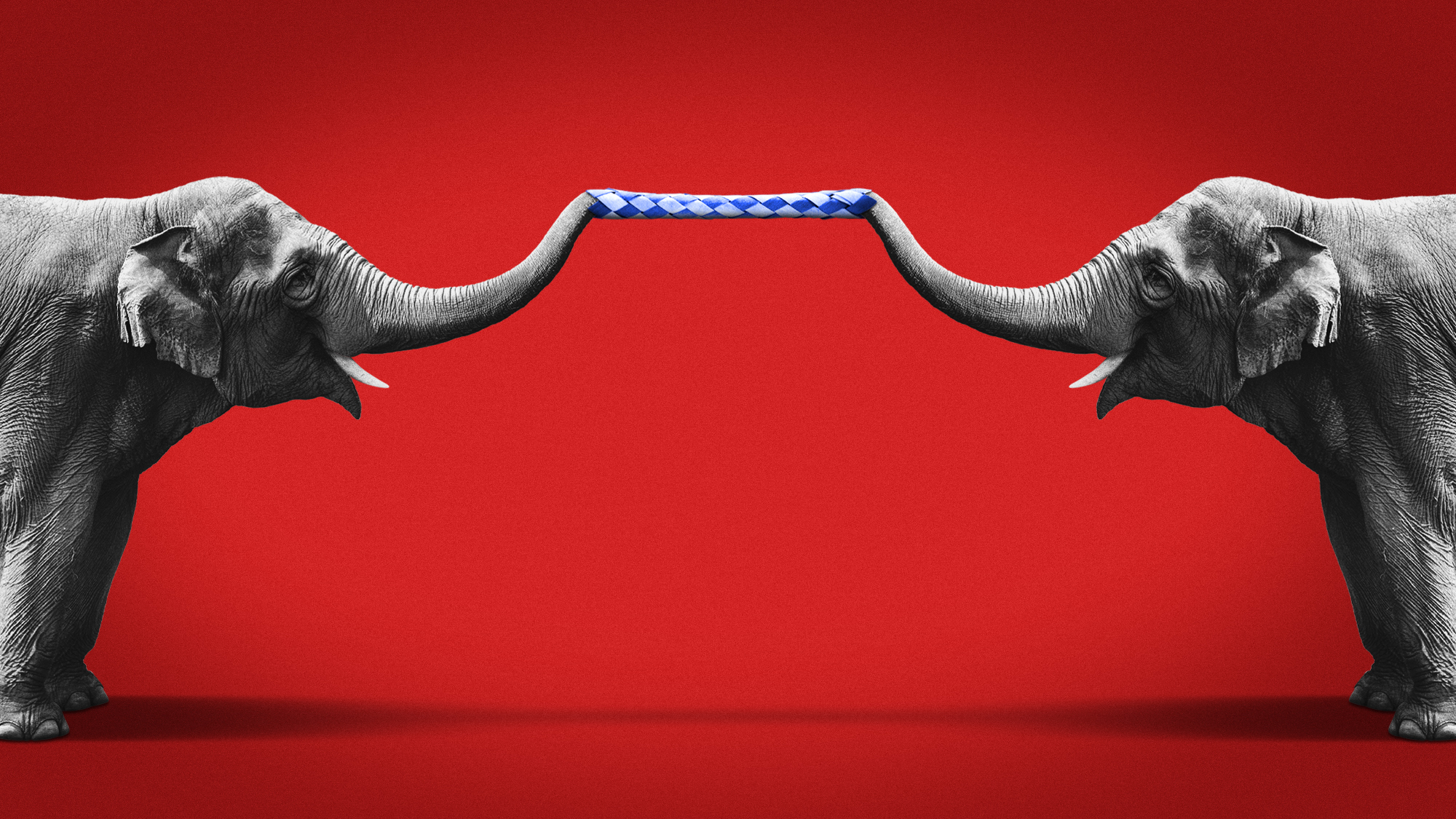After the fight, will McCarthy hold any power?
The sharpest opinions on the debate from around the web


A free daily email with the biggest news stories of the day – and the best features from TheWeek.com
You are now subscribed
Your newsletter sign-up was successful
Rep. Kevin McCarthy (R-Calif.) held on to win the House speakership in the 15th vote, but to do it he had to give in to a series of demands from 20 far-right hardliners, including members of the Freedom Caucus. Some of the concessions could come back to haunt him, including one allowing a single lawmaker to launch a bid to oust the House leader. Others addressed more popular changes, including giving members of Congress at least 72 hours to read bills before they have to vote on them, and holding votes on all 12 spending bills, instead of lumping them all together in omnibus packages used to hide special-interest funding.
After the 14th ballot, McCarthy exchanged heated words with holdout Rep. Matt Gaetz (R-Fla.). Rep. Mike Rogers (R-Ala.) lunged toward Gaetz, but was restrained by another lawmaker. McCarthy backer Rep. Dan Crenshaw (R-Texas) said the challengers "degraded and just diminished and insulted" McCarthy. Rep. Chip Roy (R-Texas) said the extended process "was about empowering people — empowering rank-and-file members." After finally winning, McCarthy said Republicans had settled their differences and would now unite. In a first test for McCarthy, the House adopted its overhauled rules despite some members' concerns about McCarthy's concessions to the hardline rebels, and then passed a bill seeking to cut IRS funding. Can McCarthy hold the GOP together, or did his fight for the speaker job weaken him too much?
McCarthy won the job, but the extremists took the power
The GOP really showed off its "ideological extremism" with this sad display, wrote Stephen Collinson for CNN. Nothing demonstrated this more than McCarthy's last-minute boost from former President Donald Trump, "who incited the worst attack on democracy in modern times, to get over the line in the cliffhanger final ballot" almost exactly two years after the Capitol riot.
The Week
Escape your echo chamber. Get the facts behind the news, plus analysis from multiple perspectives.

Sign up for The Week's Free Newsletters
From our morning news briefing to a weekly Good News Newsletter, get the best of The Week delivered directly to your inbox.
From our morning news briefing to a weekly Good News Newsletter, get the best of The Week delivered directly to your inbox.
The danger McCarthy now faces goes far beyond his agreement to reinstate an old rule giving any single member the power to "call for a vote to topple him at any time." The real risk for him and his party is "that he has empowered extremists who could alienate mainstream America and in 2024 endanger the tiny new GOP majority that was built on flipping formerly Democratic seats in states like New York and California."
Actually, the fight yielded some positive changes
"McCarthy deserved better than a tortuous three-day floor fight," says Jonathan Turley in The Hill. The poor guy looked like he was "caught in a feedback loop stepping on the same rake over and over again." Then again, when you are fighting to be made the most powerful person in the House, second in line for the presidency, you can't always expect an easy win.
Besides, a little push and pull can be a good thing. Former House Speaker Nancy Pelosi (D-Calif.) "tolerated little public debate or dissent. She thrilled her base with such infamous performative acts as tearing up a State of the Union Address of then-President Trump." She pushed through "a series of party-line votes with little opportunity for amendments or even to read some bills." The deal McCarthy had to make to get over the top "is meant to redefine legislative rights — and it could have tangible improvements for the House."
McCarthy made promises on spending limits that will hurt the military
"Don't believe the happy talk that this was a healthy display of deliberative democracy," says The Wall Street Journal in an editorial. This was just a "power play" by backbenchers who "saw an opportunity to exploit the narrow GOP margin of five seats to put themselves in positions of power that they hadn't earned through seniority or influence with colleagues." Now that the rebels also demanded "seats of power for themselves," winning two Rules Committee seats, they will limit McCarthy's "maneuvering room as he tries to put together majorities for legislation."
A free daily email with the biggest news stories of the day – and the best features from TheWeek.com
One of the concessions the far-right won was "a pledge that the top-line budget figure for domestic discretionary spending in fiscal 2024 won't exceed what it was in fiscal 2022." Well, that sounds good, but it includes defense spending. If the cuts are divided between defense and non-defense funding, the military budget "would have to fall by $75 billion." GOP defense hawks might be able to fight to get the military more, "but the pressure for defense cuts will be great."
The GOP 'clown show' can't do much... except shut down the government
This "Republican clown show" won't accomplish anything significant, says Bret Stephens in The New York Times, "particularly since doing so would require them to work with a Democratic president and Senate." But now we have to rely on the newly elected "squeaker of the House" to get his fellow Republicans to pass really important legislation. We're about to hit the debt ceiling. "If we can avoid another useless government shutdown, I'll consider it a minor miracle."
Was the real loser here McCarthy, or Trump?
McCarthy wasn't the only one who took some lumps, says The Miami Herald in an editorial. Rep. Matt Gaetz (R-Fla.), one of the leaders of the hardline holdouts, threw Trump's name into the mix of speaker candidates, even though the Constitution is not clear on whether someone not in Congress can fill the position. Trump got a single vote in what "undoubtedly was a symbolic dagger" in the former president's influence among his fellow Republicans. "The lack of seriousness aside, the lack of votes for Trump was a public declaration of independence by other Republicans."
Harold Maass is a contributing editor at The Week. He has been writing for The Week since the 2001 debut of the U.S. print edition and served as editor of TheWeek.com when it launched in 2008. Harold started his career as a newspaper reporter in South Florida and Haiti. He has previously worked for a variety of news outlets, including The Miami Herald, ABC News and Fox News, and for several years wrote a daily roundup of financial news for The Week and Yahoo Finance.
-
 The plan to wall off the ‘Doomsday’ glacier
The plan to wall off the ‘Doomsday’ glacierUnder the Radar Massive barrier could ‘slow the rate of ice loss’ from Thwaites Glacier, whose total collapse would have devastating consequences
-
 Trump’s fuel blockade puts Cuba in crisis mode
Trump’s fuel blockade puts Cuba in crisis modeIN THE SPOTLIGHT Plummeting tourism, scrambling airlines and rolling blackouts are pushing Cuban society to the brink
-
 ‘The mark’s significance is psychological, if that’
‘The mark’s significance is psychological, if that’Instant Opinion Opinion, comment and editorials of the day
-
 Why are Republicans leaving Congress?
Why are Republicans leaving Congress?Today's Big Question GOP dysfunction puts the House majority at risk
-
 'Elections should be — and often have been — clarifying'
'Elections should be — and often have been — clarifying'Instant Opinion Opinion, comment and editorials of the day
-
 Kevin McCarthy let the House win
Kevin McCarthy let the House winThe Explainer A burnt out former Speaker decides it's better to fade away.
-
 House passes GOP spending bill as Democrats shrug off 'goofy' laddered structure
House passes GOP spending bill as Democrats shrug off 'goofy' laddered structureSpeed Read House Speaker Mike Johnson had to rely on Democrats to fund the government through at least Jan. 19, though some found his methods a little bizarre
-
 Has the GOP speaker's race gone from firing squad to royal rumble?
Has the GOP speaker's race gone from firing squad to royal rumble?Today's Big Question What was once a single-file sequence of aspiring Republican speakers is degenerating into a nine-person free-for-all
-
 Rep. Jim Jordan's speaker bid: Are Republicans damned either way?
Rep. Jim Jordan's speaker bid: Are Republicans damned either way?Today's Big Question Win or lose, Ohio congressman's quest for the gavel could backfire on the GOP in a big way
-
 Scalise drops House speaker bid a day after winning GOP nomination. What happens now?
Scalise drops House speaker bid a day after winning GOP nomination. What happens now?Speed Read The House majority leader was the GOP's choice to succeed Kevin McCarthy, except he did not have enough Republican votes to seal the deal
-
 Is Rep. Steve Scalise's speaker bid already doomed to fail?
Is Rep. Steve Scalise's speaker bid already doomed to fail?Today's Big Question A narrow victory among the House Republican caucus could be a sign of trouble to come for the Louisiana conservative
